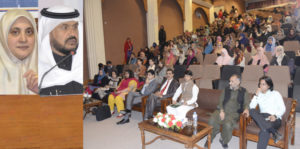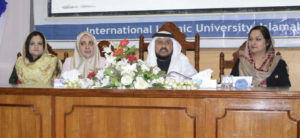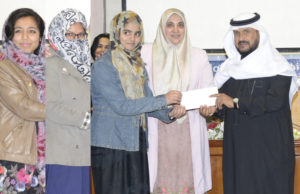 Empowerment of women is vital for establishment of peace, security and prevention of extremism and terrorism in a society and they needed to be included in every aspect of peace-building initiatives, speakers stated at a workshop. Addressing to the participants of workshop Prof. Dr. Ahmed Yousif Al Draiweesh said that each of men and women have fundamental role in the society while, there is no doubt that the education of women has had a great impact on giving opportunities and empowerment to women so that they can actively contribute to the society in all spheres of life especially for the prevention of extremism.
Empowerment of women is vital for establishment of peace, security and prevention of extremism and terrorism in a society and they needed to be included in every aspect of peace-building initiatives, speakers stated at a workshop. Addressing to the participants of workshop Prof. Dr. Ahmed Yousif Al Draiweesh said that each of men and women have fundamental role in the society while, there is no doubt that the education of women has had a great impact on giving opportunities and empowerment to women so that they can actively contribute to the society in all spheres of life especially for the prevention of extremism.
The workshop titled ‘Peace Building through Dukhtaran-e-Pakistan’, organized by Female Campus of the Islamic International University Islamabad (IIUI) and was attended by a large number of female students from several universities. IIUI Female Campus Vice President Dr Farkhanda Zia, Huma Chughtai from the Federal Judicial Academy, Dr Sobia Khan from NIPS and Nimra Ashfaq addressed the participants.
Ms. Huma Chughtai, highlighted the best practices adopted globally on role of women for promotion of peace. She said for generations women have served as peace educators, both in their families and in their societies.
“They have proved instrumental in building bridges rather than walls. They have also been crucial in preserving social order when communities collapsed,” she said, adding that the United Nations was making special efforts to recruit more women for peacekeeping and peacemaking missions and also to  make those operations more aware of gender issues.
make those operations more aware of gender issues.
“Yet their potential contribution to peace and security is still under-valued and they are still under-represented at the decision-making level,” Huma Chughtai noted, and called for providing more opportunities to women in Pakistan to play their role for societal development and establishment of peace.
In her address, Dr Sobia threw light on the socio-psychological reasoning of violent extremism and the remedies. “There are so many ‘push’ and ‘pull’ factors that lead individuals to join extremist groups. The primary individual-level ‘push factors’ include socioeconomic status, education levels, personal grievances, alienation, victimization and existential threat, and anger at injustices and persecution. The main ‘pull factors’ that attract youths to extremist groups include the narrative of religious duty, utopia building, attaining reputation, acknowledgment and the promise of adventure and a romanticized lifestyle,” she said.
“Radicalization and violent extremism are gradual processes and the solutions involve political, social, and economic changes,” she said, adding that the women being main ‘influencers’ and ‘change-makers’ in a society are an integral part of any sustainable peace-building exercise.
In her speech, Nimra Ashfaq highlighted the perception and anger management strategies to counter extremism and build peace. “Research shows that being in a globally negative mood can lead a person to form relatively pessimistic expectations, whereas being in a globally positive mood can lead one to form relatively optimistic expectations,” she said, adding that anger can colour people’s perceptions, form their decisions, and guide their behaviours. “Women constitute half of the population of our country … and therefore have a significant role to play in societal development. Their role is very crucial as not only they themselves are half of the population but also because they are responsible for bringing the other half into this world. They also act as the first educator of a child,” she said.
 IIUI Female Campus Vice President Dr Farkhanda Zia said women play a vital role in preventing the spread of extremist ideologies and activities. “As mothers, wives, sisters and daughters in family settings and as professionals in workplaces, they shape the values of community members,” she said.
IIUI Female Campus Vice President Dr Farkhanda Zia said women play a vital role in preventing the spread of extremist ideologies and activities. “As mothers, wives, sisters and daughters in family settings and as professionals in workplaces, they shape the values of community members,” she said.
The ceremony was organized to familiarize the participants about the basic objectives of ‘Duktaran-e-Pakistan’ initiative and its development and promotion on the lines of Paigham-e-Pakistan initiative of the government of Pakistan.
In the end logo of ‘Duktaran-e-Pakistan’ was unveiled and awards and certificates were distributed among the position holders.

